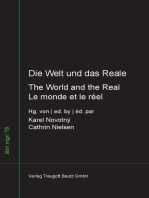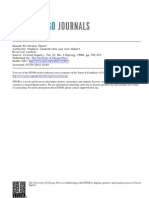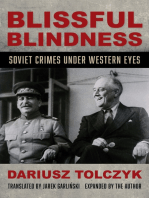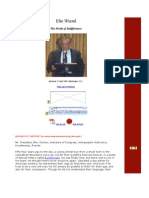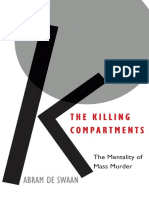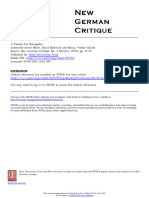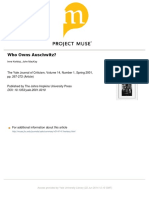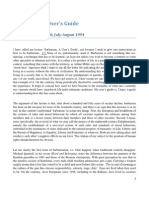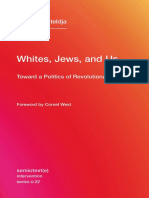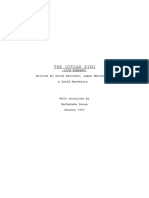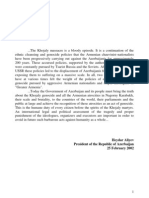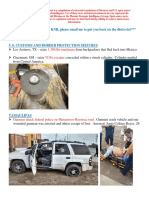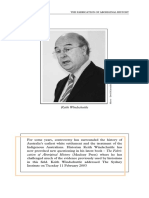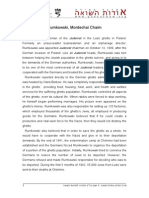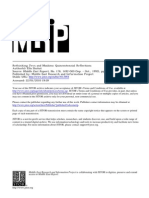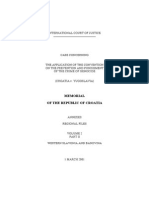0 ratings0% found this document useful (0 votes)
322 viewsJankelevitch - Should We Pardon Them
Jankelevitch - Should We Pardon Them
Uploaded by
Elis SimsonThis document summarizes and analyzes an article that argues against pardoning Nazi war criminals. It begins by noting that while some think it is time to pardon or forget the crimes of WWII after 20 years, survivors strongly disagree. It then discusses how the full horrors of the Holocaust are still being realized, with Auschwitz representing the most grandiose death factory. The article contrasts the heroism of the French Resistance with the indescribable tragedy of the death camps. It argues the Holocaust weighs on modern humanity as an invisible remorse, and some seek to rid themselves of this guilt through anti-Semitism disguised as anti-Zionism. The article concludes the legal criteria of statutes of limitations do not apply to these
Copyright:
Attribution Non-Commercial (BY-NC)
Available Formats
Download as PDF, TXT or read online from Scribd
Jankelevitch - Should We Pardon Them
Jankelevitch - Should We Pardon Them
Uploaded by
Elis Simson0 ratings0% found this document useful (0 votes)
322 views22 pagesThis document summarizes and analyzes an article that argues against pardoning Nazi war criminals. It begins by noting that while some think it is time to pardon or forget the crimes of WWII after 20 years, survivors strongly disagree. It then discusses how the full horrors of the Holocaust are still being realized, with Auschwitz representing the most grandiose death factory. The article contrasts the heroism of the French Resistance with the indescribable tragedy of the death camps. It argues the Holocaust weighs on modern humanity as an invisible remorse, and some seek to rid themselves of this guilt through anti-Semitism disguised as anti-Zionism. The article concludes the legal criteria of statutes of limitations do not apply to these
Copyright
© Attribution Non-Commercial (BY-NC)
Available Formats
PDF, TXT or read online from Scribd
Share this document
Did you find this document useful?
Is this content inappropriate?
This document summarizes and analyzes an article that argues against pardoning Nazi war criminals. It begins by noting that while some think it is time to pardon or forget the crimes of WWII after 20 years, survivors strongly disagree. It then discusses how the full horrors of the Holocaust are still being realized, with Auschwitz representing the most grandiose death factory. The article contrasts the heroism of the French Resistance with the indescribable tragedy of the death camps. It argues the Holocaust weighs on modern humanity as an invisible remorse, and some seek to rid themselves of this guilt through anti-Semitism disguised as anti-Zionism. The article concludes the legal criteria of statutes of limitations do not apply to these
Copyright:
Attribution Non-Commercial (BY-NC)
Available Formats
Download as PDF, TXT or read online from Scribd
Download as pdf or txt
0 ratings0% found this document useful (0 votes)
322 views22 pagesJankelevitch - Should We Pardon Them
Jankelevitch - Should We Pardon Them
Uploaded by
Elis SimsonThis document summarizes and analyzes an article that argues against pardoning Nazi war criminals. It begins by noting that while some think it is time to pardon or forget the crimes of WWII after 20 years, survivors strongly disagree. It then discusses how the full horrors of the Holocaust are still being realized, with Auschwitz representing the most grandiose death factory. The article contrasts the heroism of the French Resistance with the indescribable tragedy of the death camps. It argues the Holocaust weighs on modern humanity as an invisible remorse, and some seek to rid themselves of this guilt through anti-Semitism disguised as anti-Zionism. The article concludes the legal criteria of statutes of limitations do not apply to these
Copyright:
Attribution Non-Commercial (BY-NC)
Available Formats
Download as PDF, TXT or read online from Scribd
Download as pdf or txt
You are on page 1of 22
SIouId We Favdon TIen?
AulIov|s) VIadiniv JanIIvilcI and Ann HoIavl
Bevieved vovI|s)
Souvce CvilicaI Inquiv, VoI. 22, No. 3 |Spving, 1996), pp. 552-572
FuIIisIed I The University of Chicago Press
SlaIIe UBL http://www.jstor.org/stable/1344023 .
Accessed 07/12/2011 0705
Your use of the JSTOR archive indicates your acceptance of the Terms & Conditions of Use, available at .
http://www.jstor.org/page/info/about/policies/terms.jsp
JSTOR is a not-for-profit service that helps scholars, researchers, and students discover, use, and build upon a wide range of
content in a trusted digital archive. We use information technology and tools to increase productivity and facilitate new forms
of scholarship. For more information about JSTOR, please contact support@jstor.org.
The University of Chicago Press is collaborating with JSTOR to digitize, preserve and extend access to Critical
Inquiry.
http://www.jstor.org
Vl?zdimir Jankelevitch
Translated by Ann Hobart
Foreword
It is sometimes said that the deportees, the Jews, and the members of the Resistance
begin to tire their contemporaries by too often invokingAuschwitz and Oradour. Our
contemporaries, it seems, have had enough of it. They would like us to speak of
something else. The survivors of the massacre are of another opinion on this point.
Thus I permit myself in this essay to contribute to the weariness of those who are
bothered by such horrible memories. My friend Henry Bulawko, president of the
Amicale des Anciens De'porte's Juifs de France, did not deem these pages anachronis-
tic, however belated they may be. I am unable to express all that their appearance
owes to him. May he find here the expression of my fraternal gratitude. My warm
thanks also go out to Roger Maria, without whom Pardonner? would have forever
remained unpublished.
This essay develops the themes that I defended in 1965 during the debates re-
garding statutory limitations for Nazi war crimes. In February 1965, under the title
"LCImprescriptible, " I pleaded against a pardon in La Revue administrative, and
I now thank the editor of this journal, Robert Catherine, whose friendship thus
allows my voice to be heard. This article itself had its origin in a letter published in
the "Libres opinions"section of Le Monde on 3 January 1965. Since all opinions
are 'free," mine, thank God, is as well. I am lucky. One must take a side in this
matter. The insurmountable horror that every normal person feels when thinking
about the death camps, this horror is a ' free" opinion. Could it be that someone could
profess the opposite opinion ? To applaud the ovens of the crematoria, could that by
Critical Inzuir7 22 (Spring 1996)
First published as Pardonner? in Vladimir Jankelevitch, lSImprescriptible. Permission to publish courtesy of Editions du
Seuil. English translation (D 1996 by The University of Chicago. 0093-1896/96/2203-0006$01.00. All rights reserved.
552
Should We Pardon Them?
Critical Inquiry Spring 1996 553
any chance be an opinion ? In any event, my ozun opinion zs at minimum an opinion
among others. And from now on it is, moreover; an of;ficial opinion, by virtue of a
unanimous vote of the French parliament. Since thzs opinion does not run contrary
to conventional morality, I will develop and justify it here.
In Le Pardon, a purely philosophical zvork that I have published elsewhere,
the answer to the question, Must we pardon ? seerns to contraidict the one g7ven here.
Between the absolute of the law of love and the absolute of vicious liberty there zs a
tear that cannot be entirely sundered. I have not attempted to reconcile the irratio-
nality of evil with the omnipotence of love. Forg7veness is as strong as evil, but evil
is as strong as forgiveness.2
Should We Pardon Them?
Is it time to pardon, or at least to forget? Twenty years are enough,
it would seem, for the unpardonable to become miraculously pardonable:
by right and from one day to the next the unforgettable is forgotten. A
crime that had been unpardonable until May 1965 thus suddenly ceases
to be so in June as if by magic. And thus the official or legal forgetting
begins tonight at midnight. It is justifiable to pursue a criminal for twenty
years, but from the beginning of the twenty-first those who have not yet
forgiven become subject in their turn to debarment and are classified as
spiteful. Twenty years: that is the time limit. And yet now is the first time
that the most indifferent have realized the full horror of the catastrophe.
Yes, it has taken them twenty years to realize its gigantic dimensions, as
after a crime out of all proportion to everyday wrongdoing or after a
very great tragedy the effects and extent of which can only be measured
gradually. The factories of extermination and especially Auschwitz, the
most grandiose among them, are in fact like all very important things:
their lasting consequences do not appear at first but develop over time
and do not stop growing. And as for the survivors of the immense massa-
cre, they rub their eyes in amazement; they learn every day what they
already knew knew, but not fully. Returned from those distant and ter-
rifying shores, they look at one another in silence.
In becoming conscious now of the worldwide catastrophe triggered
by Hitler's Germany, two faces can be discerned: on the one hand the
epic of the Resistance and on the other the tragedy of deportation; on
the one hand the heroism of the maquis and the triumphs of Free France,
magnified by the stirring words of Malraux, and on the other the death
camps; on the one hand Jean Moulin, honored by a crowd of patriots in
a flurry of waving flags on the steps of the glorious Pantheon, on the
1. See Vladimir Jankelevitch, Le Pardon (Paris, 1967).
2. This foreword is of course the same as the one that appeared in Jankelevitch,
Pardonner? (Paris, 1971).
554 VladimirJankelevitch Should We Pardon Them ?
other Jean Moulin tortured, disfigured, panting, savagely trampled un-
derfoot by brutes because the deportee and the Resistance fighter very
often were one and the same. On one side Bir Hakeim and the Paris
barricades, on the other . . . on the other an unnameable, unmention-
able, and terrifying thing, a thing from which one diverts one's thought
and that no human speech dares describe. Orchestras played Schubert
while the detained were hanged. Women's hair was stockpiled. Gold teeth
were removed from cadavers. That unspeakable thing whose name we
hesitate to pronounce is called Auschwitz. It was in that accursed place
that what Claudel calls the monstrous orgies of hate were celebrated.
People of our generation sometimes feel like the bearers of a heavy and
unmentionable secret that separates them from their children. How can
they tell them the truth? We claim that the survivor of Verdun ordinarily
does not speak voluntarily of the monstrous and mournful country from
which he comes. But what is the secret of Verdun in comparison to the
secret of Auschwitz?
This shameful secret that we cannot tell is the secret of World War
II and, in some measure, the secret of modern humanity; even if we do
not speak of it, the immense Holocaust weighs on our modernity like
invisible remorse. Comment s'en debarrasser? This title of a play by Ionesco
characterizes quite well the anxieties of today's apparently good con-
science. The crime was too serious, the responsibility too solemn, Rabi
remarks with cruel lucidity. How will they rid themselves of their latent
remorse? "Anti-Zionism" is in this respect an unexpected windfall, be-
cause it gives us permission and even the right even the duty to be
anti-Semitic in the name of democracy. Anti-Zionism is justified anti-
Semitism, finally put at the disposal of all. It grants permission to be dem-
ocratically anti-Semitic. And if the Jews were themselves Nazis? That
would be marvelous. It would no longer be necessary to pity them; they
would have deserved their fate. This is how our contemporaries rid
themselves of their problem. For all alibis are good that allow them finally
to think of something else. I propose to bring them back to this problem
in the pages that follow.
The Imprescr7ptible
O thick black smoke of the crematoria flags floating over all the
cities in the tresses of the wind. Why do you strangle me in my sleep?
Would my throat have become a chimney for you to spread your
imprecations through me?
DORA TEITELBOIM
Let me say it bluntly to begin with: all the juridical criteria regarding
statutory limitations usually applicable to common law crimes are in this
case beside the point. In the first place, it is an international crime, and
the Germans have no grounds to reproach us for interfering in their
Critical Inquiry
Spring 1996 555
business; it is not "their business." This afEair is the business of all the
trampled nations. Germany, that is the accused, is moreover in fact
the only country that has no business entering into the question. Next,
the assassination of millions of Jews, Resistance fighters, and Russians is
not a news item comparable, for example, to the murder of a woman of
independent means that occurred twenty years ago at Montelimar. The
crimes of the Germans are exceptional from every point of view for
their enormity, for their unbelievable sadism. But above all, they are
crimes against humanity in the proper sense of the term, that is, crimes
against the human essence or, if you will, against the "hominity" of hu-
man beings in general. Properly speaking Germany did not want to de-
stroy beliefs judged to be erroneous or doctrines considered to be
pernicious. It was the very being of humanity, esse, that racial genocide
attempted to annihilate in the suffering flesh of these millions of martyrs.
Racist crimes are an assault against the human being as human being, not
against such and such a person, inasmuch as he is this or that (quatenus)
communist, Freemason, or ideological adversary, for example. No, the
racist truly aimed at the beingness of the being, that is, at the human of
every human being. Anti-Semitism is a grave offense against human be-
ings in general. The Jews were persecuted because it was them, and not
at all because of their opinions or their faith. It was existence itself that
was denied them; they were not reproached for professing this or that,
they were reproached for being. To a certain degree this refusal extends
even today to the existence of the state of Israel. It is an immense conces-
sion, an unmerited gift that is believed to be conferred on Israel in ac-
cording it the right to exist, as if that recognition were not the elementary
and vital right that every human being ought to respect in every other
human being, and this without negotiations of any kind, without any
claim to gratitude. Or to take up here the beautiful title of the newspaper
founded by Bernard Lecache: We must respect our neighbor's right to
live, and our neighbor owes us nothing in return except the same re-
spect. But with a Jew it is unnecessary to trouble oneself. With a Jew
everything is permitted. When it is a Jew that is in question, being is not
self-evident. The enemies of Israel do not "recognize" the existence of
Israel. Israel is transparent, nonexistent. One does not negotiate, one
does not enter into dialogue with what does not exist. But it is not evident
that a Jew must exist. AJew must always justify himself, excuse himself
for living and breathing. His pretentiousness in fighting for subsistence
and survival is in itself an incomprehensible scandal, an exorbitance. The
idea that these "subhumans" may defend themselves fills the superhu-
mans with indignant astonishment. A Jew does not have the right to be;
his sin is to exist. As the Inquisitors, by annihilating the heretics with
exterminating fire, suppressed the Other, which existed only by some
inexplicable inadvertence of God, and thus claimed to accomplish the
divine will, so the Germans, by annihilating the accursed race in the ov-
556 VladimirJankelevitch Shou1d We Pardon Them ?
ens of the crematoria, radically suppressed the existence of those who
should not have existed. And thus the sadists who made soap from the
cadavers of deportees were not trying to increase production or improve
their yield. The colonialist, when he exploits indigenous populations, is
above all a businessman in search of labor at low cost with an eye toward
surplus value, and he uses human cattle as an instrument of labor. But
the Jew is not a simple "instrument of labor" for the German;3 beyond
that he is himself przmary materzal. The indigenous person may one day
join the ranks of the colonizers and in his turn exploit other indigenous
people; the proletarian may become an overseer, or a boss, or even a
bourgeois. But the crime of being a Jew is inexpiable. Nothing can erase
that curse: neither political affiliation, nor wealth, nor conversion. The
German insult, the insult that tramples underfoot, that uses women's hair
as a mineral substance, that infinite insult is thus a purely gratuitous insult.
This insult is not contemptuous so much as it is wicked because its pur-
pose is to debase and degrade in order to annihilate. Such relentlessness
has something sacred and supernatural about it; but I will dwell no
longer on the role that an age-old religious education could have played
here, since Jules Isaac has done it before me. If the prejudice against an
"accursed people," against a "deicide" people guilty of an original sin, is
deeply engrained in the collective unconscious, it is the German who in
effiect takes on the annihilation of the reprobates. Thus the extermination
of the Jews is the product of pure wickedness, of ontological wickedness,
of the most diabolical and gratuitous wickedness that history has ever
known. This crime was not motivated, even by "villainous" motives. This
crime against nature, this unmotivated crime, this exorbitant crime is
thus to the letter a metaphysical crime; and the criminals guilty of this
crime are not mere fanatics, nor simply blind doctrinaires, nor simply
abominable dogmatists they are, in the proper sense of the word, mon-
sters. When an act denies the essence of a human being as a human being,
the statutory limitations that in the name of morality would lead one to
absolve that act itself contradict morality. Is it not contradictory and even
absurd to call for a pardon in this case? To forget this gigantic crime
against humanity would be a new crime against the human species.
The time that dulls all things, the time that uses up sorrow as it
erodes mountains, the time that favors pardon and forgetfulness, the
time that consoles, settling and healing time, does not diminish in the
least the colossal slaughter; on the contrary, it never ceases to revive its
horror. The vote of the French parliament quite rightly expresses a prin-
ciple and, as it were, an a priori impossibility. Crimes against humanity
are imprescriptible, that is, the penalties against them cannot lapse; time has
3. See Georges Wellers, Le Systeme concentrationnaire nazi (Paris, 1965), which is particu-
larly moving in its sobriety. The important thesis of Olga Wormser-Migot, Le Systeme concen-
trationnaire nazi 1933-45 (Paris, 1968), remains the principal and definitive work on this
topic.
Critical Inquiry Spring 1996 557
no hold on them. This is not to say that a prorogation of ten years would
be necessary to punish the guilty that remain. It is in general incompre-
hensible that time, a natural process without normative value, could have
a diminishing effect on the unbearable horror of Auschwitz. Boissarie,
standing before the Action Committee of the Resistance, gave the lie to
the two grounds generally invoked to justiSj statutory limitations. Being
a crime of worldwide proportions, the proof does not disappear with time
but, on the contrary, multiplies. And public emotion in its turn does not
diminish over time but never ceases to intensiSj. Many frivolous people
who did not want to believe have been forced to learn; with the help of
the Frankfurt trials they are beginning now to realize what it was that
they had diverted their thoughts from. Even though organized grace-
lessly and in apparently bad faith, with the intention of hypocritically jus-
tifying statutory limitations in advance, this trial and the ones that
followed it will, despite them, have nevertheless served some purpose.
One is also tempted to say, in all conscience, that the Israelis were right
to abduct Eichmann and to try him themselves. Without this Israeli com-
mando raid, the indifference of Argentine justice and the complicity of
the police would no doubt have permitted the provisioner of Auschwitz,
as it had permitted Ante Pavelic, the bloody butcher of Slovenia, to die
in his bed like a good bourgeois. All the juridical norms that can be in-
voked against that abduction-Argentine sovereignty, human rights, and
so on seem inadequate and are to be dismissed when one thinks of the
immensity of the crimes committed. If only there had been a commando
raid of Resistance fighters in France to abduct General Lammerding, the
butcher of Oradour, and to keep him as well from dying in his bed, sur-
rounded by the affection of his loved ones.
What more can be said about Auschwitz? I refer here to the admir-
able article by A.-M. Rosenthal, the most beautiful and without a doubt
the most deeply moving that was ever written on this place of unbearable
horror. Let me first of all quote Rosenthal, who was a pilgrim to that hell:
Perhaps the most horrible thing about Brzezinka [Auschwitz], was
that the sun was warm and bright, the rows of poplars exquisite to
contemplate, and that near the entrance children played on the
grass. If the sun shone, if young laughter could be heard, if nature
was luminous and green, it seemed that this could only have been
the effect of some prodigious anomaly, as though arising in night-
mares. It would have been fitting for the grass to wither underfoot
and for the sun never to shine, for Brzezinka is a place of inexpress-
ible terror. And yet every day, from all parts of the globe, visitors
arrive at Brzezinka, which is probably the most sinister tourist site in
the world. They come for many reasons: to see that it was really pos-
sible, to not forget, to pay homage to the dead simply by looking at
the place of their suffering. There is nothing new to say about Ausch-
witz, if it were not that one feels compelled to testify. One feels that
558 VladimirJankelevitch Should We Pardon Them ?
it is impossible to visit Auschwitz and to walk away without a word,
without a line; that would be, it seems, a grave lack of courtesy
toward those who died there.4
Years have passed since the last lot of unfortunates "entered nude into
the gas chambers, forced by dogs and guards."5 By guards worse than
their dogs. For that was possible. This crime without a name is a truly
infinite crime whose horror deepens the more it is analyzed. One thought
he knew and yet did not know, nor to what extent. I myself who have so
many reasons to know, every day I learn something new, some particu-
larly revolting invention, some particularly ingenious torture, some
Machiavellian atrocity in which the mark of the old hereditary vampirism
can be recognized. To make soap or light shades from the skin of depor-
tees . . . this had to be thought up. One must be a vampire-metaphysician
to make that discovery. Thus one should not be surprised if an unfath-
omable crime begets as it were inexhaustible meditation. The novel
inventions of cruelty, the most diabolical abysses of perversity, the un-
imaginable refinements of hate, all of this leaves us mute and above all
confounds the spirit. The bottom of this mystery of gratuitous evil has
never been sounded.
Properly speaking, this grandiose massacre is not a crime on a hu-
man scale any more than are astronomical magnitudes and light years.
Also, the reactions that it inspires are above all despair and a feeling of
powerlessness before the irreparable. One can do nothing. One cannot
give life back to that immense mountain of miserable ashes. One cannot
punish the criminal with a punishment proportional to his crime: for in
relation to the infinite all finite magnitudes tend to equal one another;
hence the penalty hardly seems to matter; strictly speaking, what hap-
pened is inexpiable. One does not even know any more whom to arrest,
whom to accuse. Will we accuse those honest bourgeois from the prov-
inces who formerly were officers of the SS? Close up, the executioner is
rather sympathetic, and sadism cannot always be read in the face of the
sadist. Will we accuse those placid and easygoing German tourists who
look so well and must surely have good consciences? They would cer-
tainly be astonished to be thus taken to task and would wonder what we
could want them for and what it was all about. The descendants of the
executioners are in a good mood, and they find it completely natural to
travel in noisy packs, as though nothing were wrong, across that Europe
which their armies had submerged in fire and blood. No one here below
has a bad conscience, that is well known. No one is guilty because no one
was ever a Nazi; thus the monstrous genocide, a catastrophe in itself like
earthquakes, tidal waves, and the eruptions of Vesuvius, is not the fault
4. A.-M. Rosenthal, "Rien de nouveau a Auschwitz: Ou prier?" L'Observateur du Moyen-
Orient, 12 Sept. 1958, p. 23.
5. Ibid.
Critical Inquiry
Spring 1996 559
of anyone. One may as well accuse the devil! The devil, Jung says, has
always existed, the devil existed before man, the devil is the eternal prin-
ciple that has perverted pure humanity! And thus there will always be
evil ones. Strictly speaking the inculpation of the devil is not a monstrous
absurdity but rather a providential convenience. For the devil has broad
shoulders; he can take on everything! From the moment that it becomes
the fault of the "eternal principle," it is obviously no longer the fault of
Eichmann or of Bormann or of anyone at all.
So philosophical a discovery would obviously satisfy the advocates of
statutory limitations. Could there by any chance be people capable of
finding attenuating circumstances for the wretches who killed children
with injections of phenol to the heart and performed experiments on
pregnant women? Alas, I am afraid I must acknowledge that such indul-
gent advocates exist; they are neither horrified by the massacre of six
million Jews nor particularly astonished by the gas chambers. They find
these crimes in no way exceptional; they are not convinced of their mon-
strosity; they are not in agreement, it seems, as to the number of millions.
How many millions would it take to move them? Ajournalist full of good
sense even found that the difference between Hitler's crimes and those
of others was simply(!) quantitative. According to the qualitative criteria
of this brilliant journalist, the millions of exterminated Jews and Resis-
tance fighters doubtless were not sufficiently distinguished victims. Other
essayists in search of alibis have recently discovered that there were Jew-
ish capos whom the Germans themselves put in charge of overseeing
and denouncing their comrades. Never having found, as everyone
knows, Christian accomplices in the occupied countries, the Germans
thus found some among the Jews? What a windfall for a good conscience
that, in spite of everything, feels a bit heavy and even vaguely guilty! One
can imagine the enthusiasm with which a certain segment of the public
rushed to that attractive perspective-were the Jews perhaps themselves
collaborators after all? Now there is a providential discovery! And if by
chance the Jews exterminated themselves? If by chance the deportees
shut themselves into the gas chambers? These Jews are so bad that they
are capable of having themselves incinerated in the crematoria on pur-
pose, out of pure wickedness, to be as disagreeable as possible to us their
unfortunate contemporaries. For the Jews are always wrong: wrong in
living; wrong in dying; wrong in taking up arms against the cutthroats
who dream of exterminating the survivors of Auschwitz; wrong in letting
themselves be massacred; wrong in defending themselves; wrong in not
defending themselves; obliged to give evidence of their ordeal before
those who peacefully went about their business during the occupation;
required to make their account to former collaborators and to take les-
sons from them on the proper means of resisting torturers; defended
with rather patronizing condescension by magnanimous spirits who
never took the slightest risk for the Resistance. In any case, we see here
560 VladimirJanke'le'vitch Should We Pardon Them?
our polemicists unburdened of so many disagreeable scruples and mor-
ally justified in no longer thinking of them.
One must take a side: concentration camps stir up numerous polem-
ics. Polemics over Auschwitz? Yes, as astounding as this may appear: po-
lemics! A person with any feeling or sense obviously must ask himself
what such polemics could be about and how it is that the polemicists have
not taken this opportunity to remain silent. But no! People debate with
virtuosity when they could just as easily be quiet, and contestation, to use
today's term, proceeds at a brisk pace. The most horrible evidence, the
most hallowed and cruel sentiments that a person can experience are
handed over as fodder for debate. Our dialecticians are in rare form,
perfectly at their ease, and they seem in no way disturbed to have to
sustain such a horrible discussion. "The Treblinka affair," they say. One
is tempted, as the only possible response, to put before their eyes the
hallucinatory commemorative photo album that our friends from the
Federation Nationale des Deportes et Resistants published on the occa-
sion of the twentieth anniversary of the liberation of the concentration
camps. Let us leave them alone before these horrible images and tell
them to sleep well, if they can.
It must be said again: the assessment of the degree of guilt of the
wretches who massacred Jewish children en masse and then gathered up
their little shoes, this assessment is not a subject of debate. In a debate there
is a pro and a con and a mixture of pro and con, as there is at the Societe
FranSaise de Philosophie or at the colloquia of Cerisy-la-Salle. France has
for some years been in a permanent state of colloquium. But Auschwitz,
I repeat, is not a subject for a colloquium; Auschwitz precludes dialogue
and literary conversation. The mere idea of confronting pro with con in
this case has something shameful and absurd about it; such a confronta-
tion is a grave indecency with respect to the tortured. Roundtables, as
they are called, are for the games to which our brilliant talkers give them-
selves over each summer during the leisure hours of their vacations, but
the death camps are incompatible with this kind of debate and philosoph-
ical babble. Moreover, Nazism is not an "opinion," and we must not get
in the habit of debating it with its advocates. I must insist again: the un-
nameable sufferings of which Auschwitz remains the monstrous symbol
exclude the mediocrity of feeling and the pedantry of hairsplitting, nor
are they designed for the professional humorists of Munich and else-
where. No, we do not feel like joking. Thus we withdraw from the "collo-
quium," having nothing to say to the brilliant casuists who look upon the
crematoria as they look upon the horrors of war in general. Auschwitz is
not, like pillaging, bombing, and the difficulties of furnishing supplies,
one of those good and decent misfortunes common to all honorable disas-
ters. Auschwitz is unmentionable. Auschwitz is not simply a particular
case of human barbarism. Nor was that war like any other. And the Resis-
tance fighters who said no to servitude are not simply "veterans." It is
Critical Inquiry Spring 1996 561
one of the most convenient alibis of a good conscience to represent the
Second World War as a simple settling of accounts between adversaries,
a settling of accounts with, according to custom, indemnities of war, repa-
rations, and annexation of territory; once accounts were settled, it is no
longer clear why the little Franco-German misunderstanding would still
occupy our thoughts. In this vulgar dispute one winds up having trouble
distinguishing if it was in fact Germany that advanced upon France or-
who knows?-France upon Germany. But Hitler's war does not resemble
the First World War in any way. The generous pacifism of Romain Rol-
land that challenged traditional chauvinism, which was nationalist and
militarist, set itself apart from the "Franco-German conflict." But after
1939 one could no longer be "above the fray"; that is why the Resistance
was not above but inside it. I insist again: Auschwitz is not an "atrocity of
war" but a work of hatred. A quasi-inextinguishable work of hatred. I read
somewhere that Treblinka was made possible by Verdun. Verdun is, in
effect, like Borodino, virtually the classic example of the horrors of war
justly stigmatized by Goya and Vereshchagin. Like Borodino, but much
more successful. A grandiose slaughter. However, the shells of Verdun
did not single out a damned race. In the complacent evocation of these
memories, veterans even find motives for dignity, schoolchildren a lesson
in heroism, politicians an opportunity to celebrate the Franco-German
"fellowship of arms." An episode of glory, I tell you, for two "great"
peoples inexplicably risen against one another6 and now reconciled in a
general transport of compassionate feeling. One can understand, after
all, why the "Franco-German rapprochement" so little affects the Jews,
why finally that "reconciliation" does not concern them in any way. That
Germany renounces all wars of aggression and any pan-Germanic de-
signs on France is already a lot, and we congratulate ourselves over this.
But military invasion and the extermination ofJews are two distinct en-
terprises, enterprises that only partially overlap and that in the final anal-
ysis can go without one another. In 1914 there was an invasion, but there
was no Auschwitz. And, reciprocally, one can easily conceive a situation
in which those who regretted having launched the imperialist war would
in no way regret Auschwitz. In this situation, rather similar to that of
1940, the Jews would be considered the principal obstacles to the great
Franco-German reconciliation; those detestable Jews impede Franco-
German conferences, Franco-German love fests and feasts. It is necessary
to understand the Jews. They do not simply feel, in common with their
fellow citizens, the legitimate resentment nursed in relation to the tor-
turers of France. They are in addition especially concerned, intimately
offended, personally humiliated.
Can the inexplicable, the inconceivable horror of Auschwitz be re-
duced to the indeterminate abstractions known as violence, heavy artil-
6. Thanks to the Jews no doubt.
562 VladimirJankelevitch Should WePardonThem?
lery, or the horrors of war? That is to wish to drown the problem in pious
generalities, to trivialize or discreetly dissolve the exceptional quality of
genocide, to speak of everything in relation to nothing in particular.7 As
every conceptual explanation is in some sense reassuring, one can al-
ready feel reassured by the idea of subsuming Nazi anti-Semitism under a
law, of placing the death camps in a historic framework or in a trivializing
context. What if by chance Auschwitz was only a particular example of a
more general phenomenon? This confusion attests to the difficulty that
one experiences when trying to make the bad-faith quibblers understand
the specificity of each problem, to fix the attention of the muddleheaded
on a definite event. The muddleheaded have their choice of many means
to evade the uniqueness of Auschwitz, for any periphrasis is good that
will allow us to skirt those two horrible syllables and to speak of some-
thing else. I have said that the problem of Auschwitz for distinguished
intellects seems to inhere in these words: How to unburden ourselves of
it? The most shrewd among our brilliant talkers invoke the crimes of
Stalin, decidedly providential crimes since they use them to excuse those
of Hitler. But the crimes of Stalin are not an answer to everything. An
even better one has been found, too: Hitler was inspired by the sultan
who organized the odious massacre of Armenians at the beginning of
the century. If the Jews were exterminated, it was ultimately the fault of
Abdulhamld. An eminent historian has even written that the "drownings
at Nantes" under the Terror were the true precedent of Auschwitz and
Treblinka. Thus nothing happened to the Jews that was not very ordi-
nary, nor was our eminent colleague in any way astonished by it. We
scarcely have to wait for the result of these comparisons. After a certain
time no one will know any longer what it was all about. Which was obvi-
ously the end sought after.
But today it is about neither the slaughter of Armenians, nor the hell
of Verdun, nor torture in Algeria, nor Stalin's purges, nor segregationist
violence in the United States, nor the Saint Bartholomew's Day Massacre;
it is about the most monstrous crime in history and about the definitive
quietus promised to the criminals who committed this crime. In the face
of such a revolting crime, the natural impulse of a person of feeling is not
to throw oneself into the archives nor to do research on the history of
violence that is more or less comparable; a person of feeling will not won-
der in what way he might exonerate the guilty or excuse the horrible
torturers. The natural impulse of a person of feeling is to become indig-
nant and to fight passionately against forgetfulness and to pursue the
criminals, as the judges of the Allied Tribunal at Nuremberg promised,
to the ends of the earth. But our distinguished talkers have something
7. Andre Neher rightly opposes this trivialization. See his "Dimensions et limites du
dialogue judeo-allemand depuis 1945," Cahiers de l'institut de science e'conomique applique'e, no.
132 (Dec. 1962).
Critical Inquiry Spring 1996 563
better to do; they absolutely must evade the atrocious genocide and find
in history other Auschwitzes that will dilute the horror of the true Ausch-
witz. I can only call this inversion of the most natural impulses of the
heart and mind perversity. When all is said and done, only unpunished
criminals, only Doctor Mengele and his kind, would be interested in such
alibis now. If everyone "did the same," as the friends of Doctor Mengele
are only too happy to prove, it is obviously pointless to become indignant;
if everyone is guilty, no one is guilty. Let us speak of everything; let us
speak of nothing. Thus let us speak of something else.
And, yet, let us speak of it all the same. In the first place a crime was
never excused by alleging that others would perhaps also be capable of
committing it. Moreover, this crime is comparable to nothing. No, Ausch-
witz and Treblinka resemble nothing-not simply because in general
nothing is the same thing as anything else but particularly because noth-
ing is the same thing as Auschwitz. This crime is incommensurable with
anything else whatsoever. I was going to say that it is a metaphysical
abomination. With their six million dead, the Jews are certainly at the
top of the list of martyrs for all time. A sad distinction, alas, and may no
one challenge these privileged scapegoats of Gothic hatred. When one
speaks to the perverse about Auschwitz, they counter with the suffering
of the Germans during the war: the destruction of their cities, the exodus
of their inhabitants before the victorious ltussian army. To each his own
martyrs, no? The mere idea of comparing or speaking in the same breath
of the unspeakable ordeal of the deportees and the just punishment of
their torturers, this idea is a calculated piece of treachery, if it is not a true
perversion of the moral sense. Perversion or treachery, this unbelievable
twisting of evidence, this scandalous reversal of roles, makes one wish to
answer, It is your turn now. Many standing before the ruins of Berlin and
Dresden will think, This is really the least that they deserved. And they
will perhaps decide that this people responsible for the greatest catastro-
phe in history still got off easy. Those who are moved by neither the
slaughter at Lidice, nor the massacre at Oradour, nor the hangings at
Tulle, nor the shootings at Mont-Valerien, Chateaubriant, Cascade, and
Chatou reserve their indignation for the bombing of Dresden by the
English, as if in this domain the Germans had not taken the initiative, as
if the destruction of Rotterdam, Warsaw, and Coventry by an implacable
adversary had not preceded the Anglo-American air raids. To the bomb-
ing of Dresden, which chills us with its horror, Auschwitz adds a new
dimension of horror. By this I mean its directed, methodical, and selective
character. It is truly the monstrous masterpiece of hate. The anonymous
and in some ways impersonal violences of war, which indiscriminately
crushed unfortunate, defenseless citizens, did not choose their victims as
the refined sadism of the Germans chose its victims. Strictly speaking,
these were unintended atrocities. The unconscious pilot who blindly
dropped his bomb on Hiroshima did not select among the human cattle,
564 Vladimir Jankelevitch Should We Pardon Them?
nor did he destroy Hiroshima out of wickedness; he did not deny the
Japanese's right to live; he was not looking to humiliate, trample, and
degrade his victim before killing him. His purpose was not to exterminate
the Japanese race nor to vilify its people but to hasten, albeit through
terror, the end of the conflict. Nor can the extermination of the Jews be
compared to the massacres that the bloody despots of history organized
to rid themselves of their enemies. Certainly (and in this at least the Nazis
were more right than they believed themselves to be) the Jews are natural
enemies of fascism. However, the extermination of the Jews is neither an
act of vengeance nor a precaution. It has nothing in common with the
deplorable excesses that so often come in the wake of revolutions but
that, however, were not meant to be by the revolutionary, for terrorism
is less often an express intention of the revolutionary than a degeneration
of the revolution. The extermination of the Jews is something completely
different. Hitler said long in advance what he was going to do and why
he planned to do it-according to what principles, in the name of what
dogma. He explained himself at length, with that inimitable combination
of metaphysical pedantry and sadism that is a German specialty. The pe-
dantic tone of German racism reminds me of both the communiques of
the Wehrmacht and the gibberish of Heidegger, and everyone knows that
today it has become one of the signs of philosophical profundity. The
theoreticians of racism and the practitioners of scientific atrocity are both
as meticulous as they are bloody, as long-winded as they are ferocious.
The extermination of the Jews was not, as was the massacre of the Ar-
menians, a sudden outbreak of violence; it was doctrinally founded,
philosophically explained, methodically prepared, and systematically
perpetrated by the most pedantic dogmatists that ever existed. It fulfills
an intention to exterminate that was long and deliberately matured; it is
the application of a dogmatic theory that still exists and is called anti-
Semitism. I would also willingly say, reversing the terms of the prayer
that Jesus addresses to God in the Gospel according to Luke: Father, do
not forgive them, for they know precisely what they do.
It is thus not a matter of the misfortunes of war. It is a matter of a
quite precise and very urgent problem: if we had allowed the Brid'oison
to babble about the bombing of Dresden and soon (who knows?) about
the "crimes" of the Resistance, statutory limitations would have gone into
effect on 8 May 1965. Do we want Doctor Mengele, the executioner of
children, the sadist who performed experiments on deportees, to soon
go home to Germany and peacefully return to his work (one trembles to
think of it) as a "practitioner"? Would you like him to publish his memoirs
soon, as everyone does, with Whatsitsname Press? But it would be too
easy to arrest only that horrible doctor, and the discovery of a number of
great criminals would do more harm than good if it should serve as a
pretext for bestowing on all the others a general dismissal of charges.
The painstaking, administrative, scientific, metaphysical massacre of six
Critical Inquiry Spring 1996 565
million Jews is not a misfortune "in itself" nor a natural disaster; it is a
crime for which an entire people is more or less responsible, and that
people, after all, has a name and there is no reason not to speak the name
of this people nor to succumb to the strange modesty that today prohibits
us from pronouncing it. A crime that was perpetrated in the name of
German superiority engages the national responsibility of all Germans.
The two Germanies, descendants of the National Socialist state, have ac-
counts to settle; that is a fact. The monstrous machine for crushing chil-
dren, for destroyingJews, Slavs, and Resistance fighters by the hundreds
of thousands, could only have functioned thanks to innumerable compli-
cities and in the complacent silence of all; the torturers tortured, and the
small fry of minor criminals helped out or laughed. Alas! from the me-
chanic for the convoys that took the deportees to their deaths to the de-
spicable bureaucrat who kept the list of victims, there were indeed few
innocent among the millions of mute or complicit Germans. To say that
it will still take a long time to discover all of the complex ramifications of
the crime is not to say that the Germans are collectively responsible or are
responsible inasmuch as they are Germans. There were some German
democrats in the camps, and we respectfully salute this elite lost in the
vociferous mob of others, of all the others. Here one cannot pass over in
silence the amazing gesture of Chancellor Brandt before the memorial to
the Warsaw Ghetto. Moreover, the admirable courage of Beate Klarsfeld
proves that the elite of the younger generation of Germans knew how to
take over from the elite of whom I have just spoken. Outside of these
elites, an entire people was associated, more or less closely, with the enter-
prise of the gigantic extermination; a people unanimously gathered
around its leader, whom it wildly approved many times, for whom it so
many times affirmed its enthusiastic support, and in whom it recognized
itself. The frightful howling from the Nuremberg rallies still rings in our
ears. That a debonair people could have turned into that pack of enraged
dogs is an inexhaustible source of perplexity and wonder. Will anyone
reproach us for comparing these malefactors to dogs? I swear in fact that
the comparison is unfair to dogs. Dogs would not have invented the cre-
matoria, nor thought to inject phenol into the hearts of children.
Has Anyone Askedfor Our Pardon?
Perhaps statutory limitations would hold less importance if the purge
had been more sincere and complete, if one felt more spontaneity as well
as more unanimity in the evocation of these terrible memories. Alas, the
disproportion between the tragedy of those four accursed years and the
frivolity of our contemporaries will stand beyond doubt as one of the
most bitter ironies of history. Should we be asked to forgive and forget?
Those for whom the shootings at Mont-Valerien and the massacres at
Oradour never amounted to much, those for whom nothing in particular
566 VladimirJankelevitch Should We Pardon Them ?
occurred between 1940 and 1945 beyond some difficulties in obtaining
supplies, those people have been reconciled with such a "polite" occu-
pying force since 1945; the day after the armistice of 1945 they had al-
ready forgotten what they were not at all eager to remember. They did
not wait twenty years for statutory limitations to go into effect. When they
speak of the "wall of shame," you understand that they are thinking of
the wall that inhibits communication between the two Berlins; they are
not aware of the tragic wall that enclosed the five hundred thousand con-
demned to die in the Warsaw Ghetto. A pardon? It was already foreshad-
owed during the occupation itself in their consent to defeat and
unhealthy abandonment to nothingness, and it appeared immediately
after the war in the rearming of malefactors, in the rehabilitation of male-
factors, in shameful leniency toward the ideology of malefactors. Thanks
to indifference, moral amnesia, and general superficiality, pardoning to-
day is a fait accompli. Everything is already pardoned and settled. There
is nothing left for us now but to establish a sister city relationship between
Oradour and Munich. Certain remarkably unembittered French citizens
found it completely natural six months after the war to renew fruitful
business and recreational contacts with the former torturers of their
homeland. As if the frightful humiliation of 1940 did not concern them.
As if the shame of capitulation had never touched them. Sure, go vacation
in Germany. Austria welcomes you. Autumn in Ravensbruck is marvel-
ous. Forgetfulness had already done its work before statutory limitations;
after statutory limitations forgetfulness would become in a sense official
and normative. Our epoch is indeed lighthearted. From here on we
would have the right to be lighthearted; we would have a juridically
light heart.
As for the Germans themselves, why would they feel ostracized when
no one was asking them to justify themselves? There is something amaz-
ing about the good conscience of the Germans today. The Germans are
an unrepentant people. If Germany seems to have a new face, it is be-
cause it received its deathblow at Stalingrad, because the Russians took
Berlin, because the Allies disembarked at Normandy and the Free French
Forces disembarked in Provence; without the tanks of Joukov, Patton,
and Leclerc Germany would still be controlled by Hitler, and triumphant
Nazism would reign throughout Europe on the ashes of martyrs. What
would have become of the trampled and enslaved peoples if the enraged
dogs of Europe had had heavy water before the Allies? German repen-
tance, its name is Stalingrad, its name is the breakthrough at Avranches,
its name is defeat. It is military repentance, and it is also commercial
repentance for business purposes, diplomatic repentance for reasons of
state; their contrition is worth nothing. Germany deferred statutory limi-
tations for five years, as it had accorded reparations to Israel or offered
indemnities to the spoliated, because this was in its interest at the mo-
ment, because it sought to "make up" for its past misdeeds. Under pres-
Critical Inquiry Spring 1996 567
sure from democratic public opinion in Europe and from the unified
Resistance, Germany in fact offered this trifling extension of the period
for statutory limitations, but after how much procrastination and deplor-
able haggling! The right-thinking people who were irritated by our re-
fusal to wipe the slate clean will no doubt seize the opportunity of this
extension to finally think about other things. Perhaps public opinion,
which the passion of the Resistance at last managed to arouse, will now
allow itself to be demobilized in turn? But we, we know perfectly well that
the grace of conversion has not suddenly touched the Germans. Certain
scandalous verdicts,8 some worrisome signs everything declares the
spectacular bad faith of the Germans. And the Austrians will display this
more and more in their pursuit of criminals whom in their innermost
heart of hearts they cannot bring themselves to repudiate. If they pursue
them reluctantly and without conviction, it is because they recognize
themselves in them.
To pardon! But who ever asked us for a pardon? It is only the distress
and the dereliction of the guilty that would make a pardon sensible and
right. When the guilty are fat, well nourished, prosperous, enriched by
the "economic miracle," a pardon is a sinister joke. No, a pardon is not
suitable for the swine and their sows. Pardoning died in the death camps.
Our horror over that which properly speaking reason cannot conceive
would smother pity at its birth. If only the accused could have shown us
pity. The accused cannot have it all ways-cannot reproach the victims
for their resentment, vindicate their own patriotism and good intentions,
and presume to be pardoned. One must choose! To presume to be par-
doned one must admit to being guilty, without conditions or alleging ex-
tenuating circumstances. Today is the first time since 1945 that the
Germans have pretended to apologize; they have discovered that they
perhaps have some accounts to settle with us, and they offer the alms of
a few explanations. If we have not heard before now a single word of
sympathy it is because we fled from all contact with the Germans. Was it
for the injured to seek such contact? German men and women did not
then think of this all by themselves? Would they have had the idea of
writing so many beautiful, emotional letters to the weekly newspapers if
we had not protested against statutory limitations? Nothing better proves
the lack of spontaneity of a certain segment of the young German popula-
tion, its lack of urgency to go before the victims, its lack of basic good
conscience. Get ahead of one's victim, that was the thing; ask for a par-
don! We have waited for a word for a long time, a single word of under-
starlding and sympathy. We have wished for it, this fraternal word!
Certainly we did not expect that they would beg our forgiveness. But the
understanding word, we would have received it with gratitude, with tears
8. See Bernard Lavergne's excellent study, "L'Absolution en Allemagne des crimes de
guerre," Annete politique et economique, no. 183 (1945).
568 VladimirJanke'le'vitch Should We Pardon Them?
in our eyes. Alas! as an act of repentance, the Austrians have presented
us with the shameful acquittal of torturers. We are still waiting for the
solemn gesture of reparation or disavowal that such a terrible moral re-
sponsibility imposed on German intellectuals, on German professors, on
German philosophers, and even (I do not feel like laughing) on German
"moralists," if there be any. But German intellectuals and moralists have
nothing to say. This does not concern them. They are very busy with the
"Dasein" and "the existential project." And yet the intellectuals could
spare a manifesto! The initiative will never come, nor will the grand pro-
test by which German thought would have dissociated itself uncondition-
ally from that hallucinatory past, which concerns it after all, and would
have rejected it with horror. And how could it repudiate a doctrine in
which Heidegger is immediately recognizable and that so clearly bears
the stamp of Nietzsche? It must be said: Germany as a whole-its youth,
its thinkers they all have bypassed the most horrible tragedy in history;
they have no connection with the exterminated millions without sepul-
chers, no way to think about that catastrophe; they feel in no way respon-
sible, acknowledge no mistake. Apparently their so-called existentialism
does not extend that far. Why would we pardon those who regret
their errors so little and so rarely? Robert Minder says forcefully that
Heidegger is responsible not only for what he said under Nazism but also
for what he refused to say in 1945.9 On the contrary, the German today
seems to have acquired an overwhelming pruritus to discuss, contest, and
even accuse; he takes the high ground, metes out praise and blame. Not
him he does not agree. Agree about what? About the number of vic-
tims? About the kind of gas used to asphyxiate women and children? It
is like a dream. Soon we will feel guilty in our turn regarding the Ger-
mans, though happy that they will concede that there was error on both
sides. Where did they get this confidence? Where did this amazing good
conscience come from? No doubt we should say, this total lack of con-
sciousness! It is Germany that is decidedly the offended party and whose
distress is of concern to fine minds. Will the deportees apologize in their
turn for having held public attention for so long? The way things are
going, we will wind up discovering that the torturers were truly the vic-
tims of their victims. It is not the millions of exterminated that interest
our Sudeten of Parisian journalism but the fate of the unfortunate Ger-
mans expelled from Prussia and Bohemia by the Slavs. From now on it
is no longer a matter of the massive slaughter of innocents, the victims
of German rage. What matters is knowing whether Heidegger has been
slarldered, and it is we who must settle accounts with him! Millions of
unfortunates died of hunger, cold, and misery in the concentration
camps, but the great thinker, he will die in his bed a great thinker. All the
9. See Robert Minder, "Hebel et Heidegger: Lumiere et obscurantisme," in Utopies et
institutions au dix-huitieme siecle, ed. P. Francastel (Paris, 1963).
Critical Inquiry
Spring 1996 569
same, we will not begin a conversation with the metaphysicians of Na-
tional Socialism, nor with their friends, nor with the friends of their
friends, nor with the Sturmabteilungen of German philosophy. For we
grant them only one right: to pray if they are Christians and to ask our
pardon if they are not. And in any case to be silent.
Beyond this there is something shocking in seeing former collabora-
tors, the most frivolous and egotistical of men, those who neither suffered
nor fought, recommend that we forget past offenses; they invoke "chari-
table duty" to preach to the victims about a pardon that the torturers
themselves never asked for. Caring for the victims, taking account of their
injuries, is this not also a charitable duty? As for the exterminated mil-
lions, the tortured children, they are as worthy as the Germans and other
Sudeten of moving the proponents of pardoning. And who, if you please,
are these indulgent judges? Why are they in such a hurry to turn the
page and to say, with the former SS officers, Schluss damit? Where were
they, what did they do during the war? On what grounds would they
dare offer pardons in our name? Who asked them or gave them the right
to do it? Everyone is free to pardon the offenses that he has personally
suffered if he chooses to, but those of others, what right does he have to
pardon them? Jean Cassou also addresses the friends of the Nazis: "Who
are you, you who make yourselves the defenders of Nazi criminals? In
whose name, by whose authority, in light of what principles, in the service
of what interests, to what ends do you judge yourself qualified to ask that
we cease all proceedings against them and leave them forever in peace?"
I would add this: I do not see why it should be up to us, the survivors, to
pardon. Let us rather beware that complacency about our beautiful soul
and our noble conscience, that the opportunity to assume a pathetic atti-
tude and the temptation of playing a role do not one day make us forget
the martyrs. It is not a question of being sublime; it is enough to be loyal
and serious. In fact, why should we retain for ourselves this magnani-
mous role of pardoner? As Olivier Clement, an Eastern Orthodox Chris-
tian, wrote me in admirable terms, it is for the victims to pardon. What
qualifies the survivors to pardon in the place of the victims or in the name
of their relatives, their families? No, it is not our place to pardon on be-
half of the little children whom the brutes tortured to amuse themselves.
The little children must pardon them themselves. While we turn to the
brutes, and to the friends of the brutes, and tell them, Ask the little chil-
dren to pardon you yourselves.
Let the others, those who are not concerned, not blame us if we dwell
indefinitely on the litanies of bitterness. This matter will not be easily
settled. When six million human beings are murdered in the name of
principles, is it not to be expected that the survivors will speak of it for
awhile, that they must irritate and tire others? Many years will still be
necessary for us to revive from our stupor, for the mystery of that de-
mented hatred to be wholly elucidated. Our contemporaries will no
570 VladimirJanke'le'vitch Should WePardon Them?
doubt decide that we speak much too much about the death camps; and
they would no doubt wish that we did not speak of them any more at all.
But we have not spoken of them enough; we will never have spoken of
them enough! In fact, have we ever really spoken of them? Let us not be
afraid to say it: Now is the first that we have spoken of them. For the
importance of what happened is far from being universally acknowl-
edged. The suffering beyond measure that marked those accursed years
is out of all proportion to the pathetically inadequate renewal that the
postwar period has brought us. Bitter, scandalous irony of history! It is
almost without precedent that such a terrible cataclysm should have such
meager consequences, that the remorse for such a tragedy, the greatest
tragedy of modern times, should slip away so quickly, and almost without
leaving any trace in human memory. So many tears, and to come to this!
Since 1945 other causes have mobilized generous people, and other in-
justices have aroused the indignation of youth; sometimes they have even
provided an alibi by creating a diversion from our obsessive nightmare,
by keeping us from realizing this horrible thing, the thought of which,
strictly speaking, no person can bear. Since nothing more can be done
against the German factories of death, let us at least protest, and with all
our strength while there is still time, against torture. This way we have
avoided despair. Fortunately, the newly persecuted are not alone any
longer, because democrats from around the world join their cause. But
the Jews, they were alone. Absolutely alone. That poignant solitude, that
absolute dereliction is one of the most frightful aspects of their ordeal.
There was not yet a United Nations, nor international solidarity. The
press was silent. The Catholic Church was silent. Neither one nor the
other had anything to say. Roosevelt knew, but he remained silent in or-
der not to demoralize the boys. The Poles were horrified but little in-
clined to run risks for the Jews, and let death do its diabolical work almost
before their eyes. Everyone is more or less guilty of nonassistance toward
a people threatened with death. "Universal conscience," as the paladins
of the "holy war" call it, was certainly more moved by the burning of the
roof of a mosque than by the premeditated and scientific slaughter of six
million human beings. This is why we say that we have never spoken of
this thing. We must indeed finally speak of it. We must indeed say what
it was, must we not?
But in the face of what has happened, what should we do? In the
proper sense of the verb do all one can do now is make impotent, sym-
bolic, even irrational gestures, like refusing to go to Germany any more-
much less Austria and to accept neither indemnities from the Germans
nor their reparations. Reparations, alas! Reparations for littleJewish chil-
dren whom German officers, to amuse themselves, chose as living targets
for shooting practice. Aided by the exigencies of cohabitation, torturers
retired from their business of torture will always find negotiating part-
ners little repelled enough to enter lightheartedly into financial relations
Critical Inquiry Spring 1996 571
of mutual interest to them and to take on what we are too disgusted to
do. Our refusal is not without meaning, however. Andre Neher clarified
the moral significance of that refusal with admirable seriousness and
bravery.l It was time for Neher to remind us of it: life without reasons
for living is not worth living; life without reasons for living is only what it
is-the life of an ant or a sheep. In our turn, we say to the Germans,
Keep your indemnities, crime doesn't pay. There are no damages that
can compensate us for the execution of six million; there are no repara-
tions for the irreparable. We don't want your money. Your marks horrify
us, as does, even more so, your truly German intention of offering them
to us. No, business isn't everything. No, vacationing isn't everything, nor
is tourism, nor are lovely trips or festivals, if they are Austrian. But you
can't understand that. We give up all of these very attractive benefits
wholeheartedly. And as we cannot be friends with everyone, we choose
to irritate the fans of Franco-German sister-city agreements rather than
hurt the survivors of hell.
And thus something is incumbent upon us. These innumerable
dead, these massacred, these tortured, these trampled, these offended,
are our business. Who would speak of them if we did not speak of them?
Who would even think of them? In the universal moral amnesty long
accorded to the assassins, the massacred have only us to think about
them. If we ceased to think of them, we would complete their extermina-
tion, and they would be definitively annihilated. The dead depend en-
tirely on our loyalty. Such is the case for the past in general; the past
needs us to help it, to recall it to the forgetful, the frivolous, and the
indifferent. Our celebrations must endlessly save it from nothingness, or
at least hold back the nonbeing to which it is destined. The past needs us
to come together expressly to commemorate it because the past needs
our memory. No, the struggle between the irresistible tide of forgetful-
ness that eventually overwhelms everything and the desperate, intermit-
tent protestations of memory is not a fair fight; in advising forgetfulness,
the proponents of pardoning thus recommend something that does not
need to be recommended. The forgetful will take care of that themselves;
they are only too happy to. It is the past that calls for our pity and our
gratitude, for the past on its own cannot defend itself as the present and
the future defend themselves. And young people demand to know about
it and suspect that we are hiding something from them; and in fact we
do not always know how to reveal the terrible secrets of which we are the
bearers: the extermination camps, the hangings at Tulle, the massacre at
Oradour. By invoking these days of rage, calamity, and tribulation, we
protest against the work of extermination and against the forgetfulness
that completed it, that sealed that work forever; we protest against the
10. See Neher, "Non a l'Allemagne," L'Arche (Mar. 1965), as well as "Dimensions et
limites du dialogue judeo-allemand depuis 1945."
572 Vladimir Jankelevitch Should We Pardon Them ?
dark lake that swallowed up so many precious lives. We do not clear our
debts to these precious lives, to the Resistance fighters, to the massacred,
by commemorating the Day of Deportation once a year, by delivering a
speech, by putting flowers on a grave. We who by the most miraculous of
chances survive are not better than they are; all the same we who escaped
the massacre are not more to be pitied than they; all the same, our night
is not more black than theirs. We were spared the atrocious ordeal of
these martyrs; we and our children will not know their trials. Did we
deserve such luck? What happened is unique in history and doubtless
will never happen again, for there have been no other examples since
the beginning of time; a day will come when we will no longer even be
able to explain this ever-inexplicable chapter in the annals of hate. It
would be a comfort to be able to trivialize this nightmare: a war like all the
others-won by one, lost by another, and accompanied by the inevitable
misfortunes of war; in these abstractions there would be nothing that was
not completely ordinary, nothing that could upset the tranquillity of a
good conscience or trouble the sleep of unconsciousness. But, no, sleep
does not return. We think about it during the day; we dream about it at
night. And since we cannot spit on tourists or throw stones at them, only
one resource remains: to remember, to gather one's thoughts. Here
where we can "do" nothing we can at least feel, inexhaustibly. This is
doubtless what the brilliant advocates of statutory limitations will call our
resentment, our inability to settle the past. But in fact was that past ever
a present for them? The sentiment that we experience is not called rancor
but horror insurmountable horror over what happened, horror of the
fanatics who perpetrated this thing, of the passive who accepted it, and
the indifferent who have already forgotten it. This is our "resentment"
[ressentiment]. For ressentiment can also be the renewed and intensely lived
feeling of the inexpiable thing; it protests against a moral amnesty that is
nothing but shameful amnesia; it maintains the sacred flame of disquiet
and faith to invisible things. Forgetfulness here would be a grave insult
to those who died in the camps and whose ashes are forever mixed in the
earth. It would be a lapse of seriousness and dignity, a shameful frivolity.
Yes, the memory of what happened is indelible in us, indelible like the
tattoos that the survivors still wear on their arms. Each spring the trees
bloom at Auschwitz as they do everywhere, for the grass is not too dis-
gusted to grow in those accursed fields; springtime does not distinguish
between our gardens and those places of inexpressible misery. Today
when the sophists recommend forgetfulness, we will forcefully mark our
mute and impotent horror before the dogs of hate; we will think hard
about the agony of the deportees without sepulchers and of the little chil-
dren who did not come back. Because this agony will last until the end of
the world.
You might also like
- Asubjective PhenomenologyFrom EverandAsubjective PhenomenologyĽubica UčníkNo ratings yet
- Inheriting the Future: Legacies of Kant, Freud, and FlaubertFrom EverandInheriting the Future: Legacies of Kant, Freud, and FlaubertNo ratings yet
- Gale Researcher Guide for: Nathaniel Mackey and the New Musical PoetryFrom EverandGale Researcher Guide for: Nathaniel Mackey and the New Musical PoetryNo ratings yet
- Die Welt und das Reale - The World and the Real - Le monde et le réelFrom EverandDie Welt und das Reale - The World and the Real - Le monde et le réelKarel NovotnýNo ratings yet
- Europe, or The Infinite Task: A Study of a Philosophical ConceptFrom EverandEurope, or The Infinite Task: A Study of a Philosophical ConceptRating: 4 out of 5 stars4/5 (1)
- Transparency in Postwar France: A Critical History of the PresentFrom EverandTransparency in Postwar France: A Critical History of the PresentNo ratings yet
- Husserl und Thomas von Aquin bei Edith SteinFrom EverandHusserl und Thomas von Aquin bei Edith SteinPeter VolekNo ratings yet
- Speaking Hermeneutically: Understanding in the Conduct of a LifeFrom EverandSpeaking Hermeneutically: Understanding in the Conduct of a LifeNo ratings yet
- Wittgenstein: Meaning and Mind (Volume 3 of an Analytical Commentary on the Philosophical Investigations), Part 1: EssaysFrom EverandWittgenstein: Meaning and Mind (Volume 3 of an Analytical Commentary on the Philosophical Investigations), Part 1: EssaysNo ratings yet
- Clarissa Harlowe; or the history of a young lady — Volume 1From EverandClarissa Harlowe; or the history of a young lady — Volume 1No ratings yet
- Atmosphere, Mood, Stimmung: On a Hidden Potential of LiteratureFrom EverandAtmosphere, Mood, Stimmung: On a Hidden Potential of LiteratureNo ratings yet
- The University of Chicago PressDocument22 pagesThe University of Chicago PressAreej SiddiquiNo ratings yet
- Barack Obama - Holocaust Days of RemembranceDocument4 pagesBarack Obama - Holocaust Days of Remembrancemarc.kessler609No ratings yet
- The Perils of Indifference by Elie Wiesel 1Document3 pagesThe Perils of Indifference by Elie Wiesel 1api-707490871No ratings yet
- Kristeva - PolylogueDocument16 pagesKristeva - PolylogueBertoMuNo ratings yet
- Impact and Future of Historical RevisionismDocument44 pagesImpact and Future of Historical Revisionismgensgeorge4328No ratings yet
- Elie Wiesel: The Perils of IndifferenceDocument5 pagesElie Wiesel: The Perils of IndifferencespaceogNo ratings yet
- Hughes Good People Dirty WorkDocument10 pagesHughes Good People Dirty WorkSusana Vidoz100% (1)
- Obama Holocaust Days of Remembrance Ceremony SpeechDocument1 pageObama Holocaust Days of Remembrance Ceremony SpeechRemmber Much TarwiraNo ratings yet
- 1930 Tristan Tzara Paul Eluard Andre Breton Hans ArpDocument22 pages1930 Tristan Tzara Paul Eluard Andre Breton Hans ArpMuila CalNo ratings yet
- The Cultural Challenge: A Trilogy by Yannis AndricopoulosFrom EverandThe Cultural Challenge: A Trilogy by Yannis AndricopoulosNo ratings yet
- Les Gaulois Refractaires Demandent Des Comptes Au Nouveau Monde - Phillipe de VilliersDocument135 pagesLes Gaulois Refractaires Demandent Des Comptes Au Nouveau Monde - Phillipe de Villiersadiecisco1No ratings yet
- Rolling Thunder 1Document247 pagesRolling Thunder 1Dork ThunderboltNo ratings yet
- At the Mind's Limits: Contemplations by a Survivor on Auschwitz and Its RealitiesFrom EverandAt the Mind's Limits: Contemplations by a Survivor on Auschwitz and Its RealitiesRating: 4.5 out of 5 stars4.5/5 (3)
- The Sunflower: On the Possibilities and Limits of ForgivenessFrom EverandThe Sunflower: On the Possibilities and Limits of ForgivenessNo ratings yet
- For the Muslims: Islamophobia in FranceFrom EverandFor the Muslims: Islamophobia in FranceRating: 3.5 out of 5 stars3.5/5 (6)
- Faurisson, Robert - World War Two Historial RevisionDocument52 pagesFaurisson, Robert - World War Two Historial RevisiongenaferrazNo ratings yet
- Barbarism: A User's GuideDocument11 pagesBarbarism: A User's GuideJahir IslamNo ratings yet
- FELMAN, Shoshana - Paul de Man's SilenceDocument42 pagesFELMAN, Shoshana - Paul de Man's Silencedaraujo_15No ratings yet
- Panics and Persecutions: 20 Quillette Tales of Excommunication in the Digital AgeFrom EverandPanics and Persecutions: 20 Quillette Tales of Excommunication in the Digital AgeRating: 5 out of 5 stars5/5 (1)
- The Killing Compartments The Mentality of Mass Murder by Abram de SwaanDocument345 pagesThe Killing Compartments The Mentality of Mass Murder by Abram de SwaanLeãonardo TigreNo ratings yet
- Daniel Bensaïd: Paris '68, 'When History Breathed Down Our Necks' - Excerpt From 'An Impatient Life: A Memoir'Document21 pagesDaniel Bensaïd: Paris '68, 'When History Breathed Down Our Necks' - Excerpt From 'An Impatient Life: A Memoir'Terry Townsend, EditorNo ratings yet
- The Age of Violence: The Crisis of Political Action and the End of UtopiaFrom EverandThe Age of Violence: The Crisis of Political Action and the End of UtopiaNo ratings yet
- Cesaire - Discourse On Colonialism PDFDocument48 pagesCesaire - Discourse On Colonialism PDFEmir özerNo ratings yet
- A Jubilee For Renegades - Ernst BlochDocument10 pagesA Jubilee For Renegades - Ernst BlochkeithholdichNo ratings yet
- Illegalism: Why Pay For A Revolution On The Installment Plan When You Can Steal One?Document33 pagesIllegalism: Why Pay For A Revolution On The Installment Plan When You Can Steal One?mrgikarelkNo ratings yet
- Nancy - Consecration and MassacreDocument4 pagesNancy - Consecration and MassacreTimóteo P.No ratings yet
- Get Tame Words from a Wild Heart Jean Weir PDF ebook with Full Chapters NowDocument71 pagesGet Tame Words from a Wild Heart Jean Weir PDF ebook with Full Chapters NowzafreemaseuNo ratings yet
- A Humane Economy: The Social Framework of the Free MarketFrom EverandA Humane Economy: The Social Framework of the Free MarketRating: 4 out of 5 stars4/5 (8)
- Decision-Making in Times of Injustice Lesson 15Document28 pagesDecision-Making in Times of Injustice Lesson 15Facing History and OurselvesNo ratings yet
- Technique of The Coup de BanqueDocument54 pagesTechnique of The Coup de BanqueimranebrahimNo ratings yet
- Andre Breton - The Lighthouse - 1952Document3 pagesAndre Breton - The Lighthouse - 1952aleksagNo ratings yet
- Imre Kertesz Who Owns Auschwitz Translat PDFDocument7 pagesImre Kertesz Who Owns Auschwitz Translat PDFEdoardo CecereNo ratings yet
- Eric Hobsbawm Barbarism A User's GuideDocument10 pagesEric Hobsbawm Barbarism A User's GuideGoran Repac100% (1)
- Tales from the Other Side: Growing up Jewish in Nazi GermanyFrom EverandTales from the Other Side: Growing up Jewish in Nazi GermanyNo ratings yet
- Houria Bouteldja Whites Jews and Us 2016 PDFDocument152 pagesHouria Bouteldja Whites Jews and Us 2016 PDFLuis Moreno-Caballud100% (1)
- Feminist EthicsDocument15 pagesFeminist EthicsElis SimsonNo ratings yet
- Hegel and Analytic PhilosophyDocument9 pagesHegel and Analytic PhilosophyElis SimsonNo ratings yet
- 15b. Fragments On The Death of God - Friedrich NietzscheDocument6 pages15b. Fragments On The Death of God - Friedrich NietzscheElis SimsonNo ratings yet
- De Ethica17v4i1 Complete IssueDocument57 pagesDe Ethica17v4i1 Complete IssueElis SimsonNo ratings yet
- Kierkegaard in Process Volume 1 1Document113 pagesKierkegaard in Process Volume 1 1Elis SimsonNo ratings yet
- The Eichmann Polemics: Hannah Arendt and Her Critics: Michael EzraDocument25 pagesThe Eichmann Polemics: Hannah Arendt and Her Critics: Michael EzraElis SimsonNo ratings yet
- Music in Plato's LawsDocument112 pagesMusic in Plato's LawsElis SimsonNo ratings yet
- JankelevitchDocument4 pagesJankelevitchElis SimsonNo ratings yet
- The Holocaust and Philosophy - Emil FackenheimDocument11 pagesThe Holocaust and Philosophy - Emil FackenheimElis SimsonNo ratings yet
- Navigators PDFDocument9 pagesNavigators PDFJern HullNo ratings yet
- UNO Has Failed To Measure Upto The Demand of Its CharterDocument9 pagesUNO Has Failed To Measure Upto The Demand of Its Chartershah100% (1)
- GunshotsDocument1 pageGunshotsraisa13orlazaNo ratings yet
- Outlaw King 2018Document113 pagesOutlaw King 2018Helping HandNo ratings yet
- Thesis Holocaust Research PaperDocument5 pagesThesis Holocaust Research Paperfjncb9rp100% (2)
- DA133 SupplementHRDocument27 pagesDA133 SupplementHRmonel_24671100% (2)
- Lesson Plan #2: The Armenian GenocideDocument15 pagesLesson Plan #2: The Armenian Genocideapi-507972879No ratings yet
- Khojaly Genoci̇de / Hocali Soykirimi - AzerbaycanDocument113 pagesKhojaly Genoci̇de / Hocali Soykirimi - AzerbaycanYasef BayNo ratings yet
- KNR News Report May 15, 2015Document11 pagesKNR News Report May 15, 2015RobertNo ratings yet
- Rome Prezi Document Analysis Questions: Why Did The Roman Empire Decline?Document6 pagesRome Prezi Document Analysis Questions: Why Did The Roman Empire Decline?api-163448257No ratings yet
- Homosexuality in The Nazi PartyDocument24 pagesHomosexuality in The Nazi Partymarihscribd100% (2)
- Keith Windschuttle: 20 The Fabrication of Aboriginal HistoryDocument10 pagesKeith Windschuttle: 20 The Fabrication of Aboriginal HistoryHermanNo ratings yet
- Lord of The Flies Test 1 APDocument6 pagesLord of The Flies Test 1 APaghannah93No ratings yet
- American Holocaust: The Conquest of The New WorldDocument408 pagesAmerican Holocaust: The Conquest of The New WorldFikret Erdeniz100% (8)
- Marisa's ThesisDocument62 pagesMarisa's ThesisLindsey MaeNo ratings yet
- Rumkowsky JunderantDocument2 pagesRumkowsky JunderantrfarinasNo ratings yet
- Layers of The AbyssDocument78 pagesLayers of The AbyssCollin McCarter100% (4)
- Wars For Empire Apaches, The United States, and The Southwest Borderlands (Janne Lahti)Document329 pagesWars For Empire Apaches, The United States, and The Southwest Borderlands (Janne Lahti)Zoltán Vass100% (1)
- 14 Vicious Valentines 1988 Anthology - Charles G WaughDocument248 pages14 Vicious Valentines 1988 Anthology - Charles G WaughTotalSweetiEthiNo ratings yet
- Shohat On 1492Document6 pagesShohat On 1492cliodna18No ratings yet
- Warp SpawnDocument181 pagesWarp SpawnEthan Showler100% (1)
- The Goddess SekhmetDocument3 pagesThe Goddess SekhmetSabina Stella100% (2)
- Croatia Serbia Genocide Trial 8Document367 pagesCroatia Serbia Genocide Trial 8suputnik213No ratings yet
- Lucky Child by Loung Ung - Teacher Study GuideDocument8 pagesLucky Child by Loung Ung - Teacher Study GuideHarperAcademic100% (1)
- SSTORY Hemingway, Ernest On The Quai at Smyrna (1925) AnalysisDocument3 pagesSSTORY Hemingway, Ernest On The Quai at Smyrna (1925) AnalysisKristina TodorovićNo ratings yet
- Lesson 3 Native American StrugglesDocument2 pagesLesson 3 Native American Strugglesmdrirocky08No ratings yet
- Momir Nikolic Trial Judgement (Plea Agreement) (Srebrenica Genocide)Document65 pagesMomir Nikolic Trial Judgement (Plea Agreement) (Srebrenica Genocide)Srebrenica Genocide LibraryNo ratings yet
- Palestinian Women: Narrative Histories and Gendered Memory, Fatma Kassem, London: Zed BooksDocument3 pagesPalestinian Women: Narrative Histories and Gendered Memory, Fatma Kassem, London: Zed BooksRonit LentinNo ratings yet
- KM Srebrenica 8 May 2017Document32 pagesKM Srebrenica 8 May 2017MarijaNo ratings yet
- Communist War CrimesDocument143 pagesCommunist War CrimesCarlos SanchesNo ratings yet





